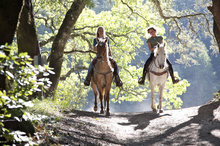Christine Skelly, the Equine Extension Specialist with Michigan State University brought to you by My Horse University and eXtension's HorseQuest has the following advice for horse owners as the warm summer months are upon us.

Protecting horses from heat exhaustion
Soon enough, we will begin to experience the hot temperatures that, when combined with humidity, can put both our horses and ourselves in danger of heat exhaustion.
With summer approaching and the daytime lengthening, we look forward to spending our days riding our equine friends. The freezing chill of winter is a distant memory as we feel the sunâs rays shining down. Soon enough, we will begin to experience the hot temperatures that, when combined with humidity, can put both our horses and ourselves in danger of heat exhaustion.
Signs of heat exhaustion in horses include:
- Reduced performance.
- Fast and/or labored breathing.
- Rapid pulse/heart rat.
- Incoordination/inability to move.
- High rectal temperature.
Some horses may experience anhidrosis, a serious and usually chronic condition when the horse can no longer produce sweat. Because evaporative heat loss through sweating is a primary cooling mechanism, anhidrosis increases the risk of heat exhaustion.
If a horse is experiencing any signs of heat exhaustion, immediately:
- Move the horse to shade with a breeze or fan.
- Apply cool water to the horseâs face and body.
- Offer the horse water.
- Call the vet for supportive treatment (IV fluids).
To prevent heat exhaustion, take the following precautions while riding this summer:
- Ride during the early morning or in the evening to avoid the hottest daytime temperatures.
- Ride in a covered pen with good ventilation.
- Decrease the intensity and/or duration of your ride.
- Increase the frequency and duration of rest periods during a ride.
- Give your horse adequate time to cool down at the end of your ride.
- Unsaddle your horse immediately after a ride.
- Spray your horse off with cool water after a ride.
- Offer your horse frequent drinks during long rides.
- Offer small drinks of lukewarm water frequently after a ride while your horse cools down.
Horses are more susceptible to heat exhaustion when they are dehydrated, deficient in dietary electrolytes or in poor physical condition, or when they are exposed to extreme hot temperatures for long periods. Daily summer care should include the following management practices:
- Ensure your horse has adequate salt in the diet.
- Ensure your horse has free access to fresh water throughout the day.
- Ensure that your horse has access to shade during the day.
- Offer your horse fresh water frequently while traveling.
- Maintain your horse at a moderate body condition score.
- Match your rides to your horseâs fitness level -- donât override your horse.
